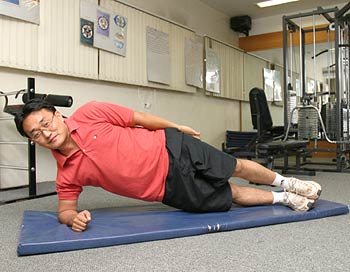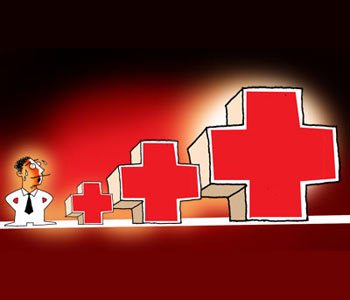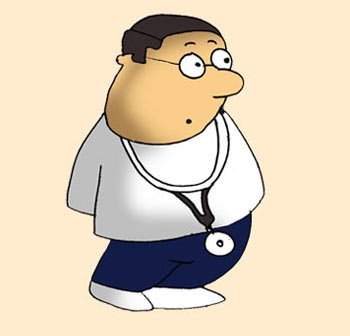 | « Back to article | Print this article |
12 New Year resolutions for your good health
New Year's eve is always a fiesta time all across the globe. It has always been a time for looking back to the past, and more importantly, loooking forward to the coming year. It's that time of the year when many people make their New Year resolutions that they will abide by in the following year.
The Babylonians invented the New Year's resolution. One of their resolutions was to return something borrowed from a friend over the year just passed. The Romans too used to make a resolution to seek forgiveness from enemies of previous years. The Chinese let off fireworks over their New Year to cleanse the self of past sins and bad habits and start again on a clean slate.
Most people have a basic idea of what resolution they want to make. Others are a little less sure of where to begin. While some go overboard trying to change everything all at once (which rarely works!), the remaining lot just doesn't bother making one because they feel it will never materialise.
Click NEXT to read a list of suggestions that will help you maintain good health in 2010.
What are your health resolutions for the New Year? If you want to share them with other readers the message board below is all yours.
1. Lose weight
Losing weight is one of the most popular New Year's resolutions. But majority of the people give up by the first month's end. Setting reasonable goals and staying focused are the two most important factors in sticking with a weight loss program.
Weight loss isn't about what you do on one day; it's about what you do today, the next day, and the day after that. The first step to losing weight in the New Year is to decide a realistic goal for yourself.
A 3 to 4 kg (around 6 to 9 pounds) weight loss per month is the recommended rate at which you should lose weight.
2. Quit drinking/Smoking
This is perhaps the most popular New Year resolution made by many of us. Making this resolution (just like any other) is easy; following it is quite difficult because it's a drastic change in your lifestyle.
Even if you've tried to quit before and failed, don't let it get you down. The key to achieve this goal is not to eliminate all at once but to gradually reduce the consumption.
Experts believe that you are more likely to achieve it if you are in a team with a concrete plan. The relationship between smoking and drinking and a whole range of diseases is well known. Thus there will always be benefits from stopping.
3. Exercise regularly
This should be your most important resolution because it's a key to resolve all health related problems.
One study reports that walking 30 minutes a day adds 1.3 years to a person's life. Another study found that walking can decrease hypertension, lower bad cholesterol levels and help you lose weight.
Regular exercise has been associated with more health benefits than anything else known to man. It keeps the muscles in good working order, stimulates the flow of blood and makes you feel better both physically and mentally.
If you think 'regularly' is a tall order try at least three times a week for about 30 minutes. Exercise during your regular daily activities by walking at lunch, taking the stairs instead of the elevator and walking short distances instead of using your car.
4. Choose nutritious food
What you eat has a great influence on the way your body work. A balanced diet is vital to good health. In the day-to-day diet, some things are good, while others are bad. On the 'good' list is fibre from fruits and vegetables, raw nuts and whole grains.
Also, choosing food based on the method of cooking is important. For example, choose baked or steamed food items over deep fried ones. It's easy to overestimate the amount of fruits and vegetables you eat, and overlook the fatty foods or extra portions you had.
Get a notepad and write down what you eat for a week. Just knowing what you are eating on a day to day basis can inspire you to eat healthier.
5. Avoid junk food
We are more likely to get attracted to junk food as they are easily available, and because of the exaggerated flavour and taste. Such foods have excess salt, refined grains, refined sugar and saturated fats (found in animal products such as meat and butter, and processed foods) and trans fat (found in partially hydrogenated oils, vegetable shortening, some types of margarine, french fries, and processed foods).
These food products have a long list of relative health hazards which are unweighable against their taste.
6. Have ample of seasonal fruits and vegetables
There are many fruits and vegetables which are available in some specific season, such food items have special ability of increasing our body's immunity as they are loaded with vitamins and minerals.
One example being watermelon which comes during summer. Its high water content helps us to beat the heat during summers. Same being true with carrots and grapes which are available during winters.
7. Reduce stress
In this modern day life, everyone leads a stressful life. Chronic stress can lead to hypertension, poor digestion, a weakened immune system and many other disorders. Thus everyone needs to de-stress.
Spend some more time with your family and friends or on your hobbies. Take a break if the stress is too hard to handle. Other methods of coping include proper breathing and meditation techniques.
Stress contributes to many severe health problems, so it is important to deal with stress earlier, rather than later.
8. Get good sleep
Sleep and rest are essential to wellness. Sleep deprivation has been linked to stress, depression, immune-system suppression, and obesity.
According to a published study, people who sleep an average of six hours a night have a 42 per cent higher chance of developing hypertension than those who get seven. The prescribed amount of sleep required is seven hours.
However, each person needs slightly different amounts of sleep. Studies suggest that it can boost your energy, immune system and helps your blood circulation to allow your body to mend after the day's activities.
If you are tired, get some rest. Exhaustion can lead to many illnesses.
9. Drink ample water
This one is pretty easy to follow. Water is essential for everybody, and it is also the key to losing weight.
Drink approximately eight glasses of water per day (not carbonated drinks).
It regulates your body temperature, lubricates your joints, boosts your energy, eliminates waste and provides fluoride for your teeth. Other fluids, such as milk, juice and decaffeinated herbal teas, can also tally up.
10. Increase your health awareness
To achieve a happy and healthy life, knowing about many aspects of health can go a long way.
Knowing about common health problems, their symptoms and prevention techniques, along with things like important vitamins and minerals, proper skin care and correct posture, will allow to prevent many diseases for the rest of your life.
11. Regular medical check up
This is one of the most ignored aspects of a healthy lifestyle.
Health should not be avoided and a visit to the doctor should not be delayed. A good idea would be to take regular health check ups and screen yourself for potential health ailments.
After all, prevention is better than cure.
12. Socialise
Turn off your television (or the computer) and try to open yourself up to new people.
Research suggests that loners are twice as much susceptible to any diseases. Don't just sit at home alone. Get out and meet people, make friends even better, go on a date.
You can even start with social networking. And while you're at it, tell those closest to you how much they mean to you. Don't wait until it's too late.
So abide by these 12 resolutions and enjoy a happy and prosperous New Year!













